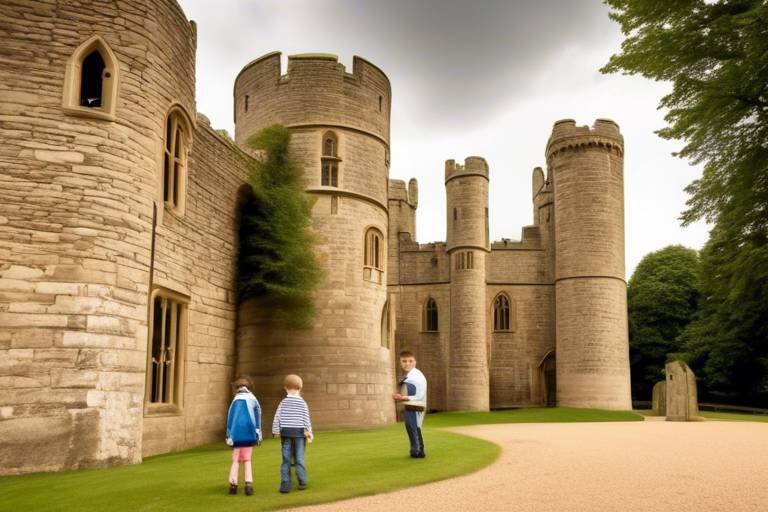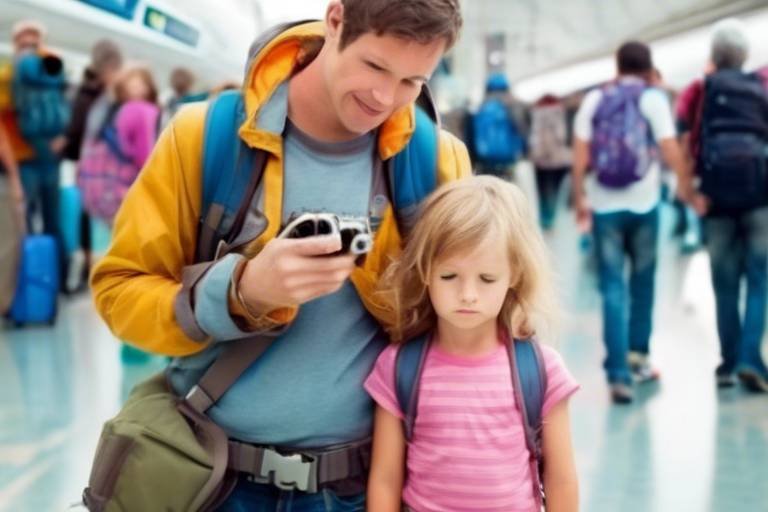The Benefits of Traveling with Your Family
Exploring the advantages of family travel, this article highlights how shared experiences can strengthen bonds, create lasting memories, and promote personal growth among family members. Traveling together is not just a fun way to spend time; it's a transformative experience that can enrich your family's life in countless ways. Imagine the thrill of discovering new places, tasting exotic foods, and immersing yourselves in different cultures—all while deepening your connection with each other. In the hustle and bustle of daily life, it's easy to lose sight of what's truly important. Family travel offers a unique opportunity to pause, reflect, and reconnect.
Traveling together allows families to spend quality time, fostering deeper connections and understanding among members. When you're away from home, the distractions of daily life fade away, and you can focus on what truly matters—each other. Shared experiences can enhance communication and create a sense of unity. Whether it's navigating through a busy airport or figuring out how to order food in a foreign language, these moments require teamwork and collaboration. They become the threads that weave your family's story, creating a tapestry of shared experiences that strengthens your bonds.
Family trips provide unique opportunities to create unforgettable memories. These shared experiences often become cherished stories that families recount for years, reinforcing their shared history. Picture this: years later, sitting around the dinner table, you reminisce about that hilarious mishap when you got lost in a new city or the breathtaking sunset you witnessed together on a beach. These memories not only bring laughter but also serve as a reminder of the love and joy you share as a family. The beauty of traveling is that it offers moments that are both spontaneous and planned, each contributing to the rich narrative of your family life.
Traveling exposes families to diverse cultures, encouraging appreciation and understanding of different lifestyles. This exposure can broaden perspectives and foster a sense of global citizenship. When children interact with people from different backgrounds, they learn to appreciate diversity and develop empathy. Imagine your child trying street food in Thailand or learning traditional dances in Mexico. These experiences teach them that the world is a vast, colorful place filled with various ways of life, and they become more open-minded individuals as a result.
Family travel often includes educational experiences, where children learn about history, geography, and social studies in engaging ways. Such adventures make learning enjoyable and memorable. Instead of reading about ancient civilizations in a textbook, your family can explore the ruins of a once-great empire together. This hands-on learning approach captivates children's imaginations and instills a love for knowledge that lasts a lifetime. The world becomes their classroom, and every trip is a new lesson waiting to be discovered.
Traveling together requires cooperation and collaboration, teaching family members the importance of teamwork. Planning activities and navigating challenges as a unit strengthens relationships and builds trust. Whether it's deciding on a destination, packing the right gear, or solving unexpected problems like a delayed flight, each experience is an opportunity to work together. This dynamic not only improves your family's ability to function as a unit but also fosters a sense of accomplishment when you overcome obstacles together.
Family trips often necessitate discussions and decision-making, improving communication skills. Engaging in conversations about plans and preferences fosters a healthier dialogue among family members. Instead of the usual routine where everyone is preoccupied with their devices, travel encourages face-to-face interactions. You learn to express your desires, listen to others, and negotiate solutions. This practice translates into better communication at home, leading to stronger relationships and a more harmonious family life.
Traveling encourages individuals to step out of their comfort zones, leading to personal development. Children and adults alike gain confidence and adaptability through new experiences. When faced with unfamiliar situations, such as navigating a new city or trying a new activity, family members learn to embrace change and uncertainty. This resilience is a valuable life skill that helps them tackle challenges with a positive attitude, both during travel and in their everyday lives.
Facing travel challenges together helps families develop resilience. Overcoming obstacles fosters problem-solving skills and strengthens the ability to handle future difficulties as a cohesive unit. Whether it's dealing with lost luggage or adjusting to unexpected weather conditions, these experiences teach families to remain calm and resourceful. The lessons learned during travel can be applied to various aspects of life, equipping family members with the tools they need to face challenges head-on.
Traveling as a family promotes healthy relationships by allowing members to interact in various settings. This dynamic encourages empathy, patience, and support among family members. The shared experiences create a sense of belonging and trust, which are essential for nurturing strong relationships. When you travel together, you learn to appreciate each other's strengths and weaknesses, fostering a deeper understanding and love that lasts a lifetime.
- What are the best destinations for family travel? Popular family-friendly destinations include Disney World, national parks, and cultural cities like Paris and Tokyo.
- How can I keep my family engaged during travel? Plan a mix of activities, including educational tours, outdoor adventures, and relaxation time to cater to everyone's interests.
- What should I pack for a family trip? Essentials include comfortable clothing, first-aid supplies, travel documents, and entertainment options for long journeys.

Strengthening Family Bonds
Exploring the advantages of family travel, this article highlights how shared experiences can strengthen bonds, create lasting memories, and promote personal growth among family members.
When it comes to family, nothing beats the joy of spending quality time together, and what better way to do that than through travel? Traveling together allows families to connect on a deeper level, fostering relationships that can last a lifetime. Imagine sitting around a campfire, sharing stories under the stars, or exploring a bustling market in a foreign country. These moments are not just fun; they are the glue that holds families together.
In today's fast-paced world, where everyone seems to be glued to their screens, family travel offers a refreshing break from the norm. It encourages families to put down their devices and engage with one another in meaningful ways. Shared experiences, whether they are thrilling adventures or quiet moments of reflection, enhance communication and create a sense of unity that is often hard to achieve in everyday life. Think of it as a reset button for family dynamics—an opportunity to reconnect and rediscover each other.
Moreover, traveling together helps families to understand each other better. When you're navigating through new environments, making decisions on the fly, or even facing unexpected challenges, you learn a lot about each other's strengths and weaknesses. This can lead to improved empathy and support among family members. For instance, if a child steps up to help navigate a new city, it can boost their confidence and encourage others to appreciate their contributions. Such moments not only strengthen bonds but also build trust among family members.
Additionally, the conversations that arise during travel can be enlightening. When you’re exploring a new place, questions naturally come up—about the culture, the history, and even about each other. These discussions can lead to a better understanding of family values and traditions, as well as an opportunity to share personal stories that might not come up during the daily grind. Family travel creates a unique environment for open dialogue, making it easier for everyone to express their thoughts and feelings.
In essence, family travel is not just about visiting new places; it’s about creating a tapestry of shared experiences that can be cherished for years to come. It’s about laughter, adventure, and even the occasional mishap that turns into a funny story later. So, whether you're hiking through the mountains, lounging on a beach, or exploring a vibrant city, remember that these moments are what truly strengthen family bonds.
Family trips provide unique opportunities to create unforgettable memories. These shared experiences often become cherished stories that families recount for years, reinforcing their shared history.
Traveling exposes families to diverse cultures, encouraging appreciation and understanding of different lifestyles. This exposure can broaden perspectives and foster a sense of global citizenship.
Family travel often includes educational experiences, where children learn about history, geography, and social studies in engaging ways. Such adventures make learning enjoyable and memorable.
Traveling together requires cooperation and collaboration, teaching family members the importance of teamwork. Planning activities and navigating challenges as a unit strengthens relationships and builds trust.
Family trips often necessitate discussions and decision-making, improving communication skills. Engaging in conversations about plans and preferences fosters a healthier dialogue among family members.
Traveling encourages individuals to step out of their comfort zones, leading to personal development. Children and adults alike gain confidence and adaptability through new experiences.
Facing travel challenges together helps families develop resilience. Overcoming obstacles fosters problem-solving skills and strengthens the ability to handle future difficulties as a cohesive unit.
Traveling as a family promotes healthy relationships by allowing members to interact in various settings. This dynamic encourages empathy, patience, and support among family members.
- What are the best destinations for family travel? Popular family travel destinations include national parks, beach resorts, and cities with rich cultural experiences.
- How can we make the most of our family trip? Plan activities that everyone enjoys, keep an open mind, and allow for some spontaneity along the way!
- Is traveling with kids worth it? Absolutely! Traveling with kids can be incredibly rewarding and helps them learn about the world.

Creating Lasting Memories
When it comes to family travel, one of the most beautiful outcomes is the lasting memories created along the journey. Imagine standing at the edge of a breathtaking vista, the sun setting in hues of orange and pink, and your family gathered around, sharing laughter and stories. These moments, often fleeting, become the fabric of our lives, woven together by experiences that are unique to each family. It’s in these shared adventures that we create cherished stories that we recount for years to come, reinforcing our family’s unique history and identity.
Traveling together allows families to step outside their everyday routines and immerse themselves in new environments. Whether it’s exploring ancient ruins, hiking through lush forests, or simply enjoying a local festival, each experience adds a new chapter to your family’s storybook. These adventures often spark conversations that might not happen at home, providing an opportunity to learn more about each other’s interests and perspectives. For instance, a trip to a historical site can ignite a passion for history in a child, or a visit to an art gallery can inspire creativity in unexpected ways.
Furthermore, the memories created during family travels often come with a sense of nostalgia that can be revisited time and again. It’s not just about the destinations; it’s about the journey itself. From the road trips filled with sing-alongs to the late-night conversations in hotel rooms, every moment contributes to a treasure trove of memories. These stories become a part of family lore, shared during holidays or family gatherings, and they serve to strengthen the bonds between family members.
To illustrate the impact of these experiences, consider the following table that highlights some of the most common types of family travel memories:
| Type of Memory | Description |
|---|---|
| Adventure Activities | Engaging in activities like zip-lining, snorkeling, or hiking that create thrilling stories. |
| Cultural Experiences | Participating in local traditions, festivals, or cooking classes that provide insight into different cultures. |
| Relaxation Moments | Quiet evenings spent around a campfire or at the beach, fostering connection and reflection. |
| Unexpected Challenges | Overcoming travel mishaps together, which often lead to laughter and resilience. |
Ultimately, these experiences are not just about the places you visit but about the connections you forge. The laughter shared over a meal, the excitement of discovering a new place, and the comfort of being together in unfamiliar surroundings all contribute to a rich tapestry of memories. The beauty of family travel lies in its ability to transform ordinary moments into extraordinary memories that last a lifetime.

Exploring New Cultures
Traveling as a family opens a gateway to that can be both enlightening and transformative. Imagine stepping off a plane and into a vibrant marketplace filled with the sounds of laughter, the aroma of exotic spices, and the sight of colorful textiles. Each destination offers a unique tapestry of traditions, cuisines, and languages that can enrich your family's understanding of the world. As you navigate through different cultures, your family not only learns about the customs and practices of others but also gains a deeper appreciation for the diversity that exists within our global community.
One of the most exciting aspects of experiencing new cultures is the opportunity to engage with locals. Whether it's sharing a meal with a family in Italy, learning a traditional dance in West Africa, or participating in a festival in Japan, these interactions create a profound connection that transcends language barriers. Such experiences not only foster a sense of global citizenship but also instill values of empathy and respect for others. As your family engages in these cultural exchanges, you begin to realize that despite our differences, there are universal themes of love, joy, and community that bind us all together.
Moreover, traveling allows families to explore various cuisines, which can be a delightful adventure in itself. Trying new foods can be a fun and engaging way for children to expand their palates and learn about the significance of food in different cultures. For instance, a family cooking class in Thailand can teach not just recipes but also the history behind each dish, emphasizing how food is intertwined with culture. It's an experience that ignites curiosity and encourages children to ask questions, fostering a love for learning that extends beyond the classroom.
Additionally, immersing yourselves in different cultural practices can lead to valuable lessons about adaptation and open-mindedness. For example, participating in a local ceremony or tradition can provide insight into the values and beliefs that shape a community. These experiences can spark conversations among family members about their own beliefs and traditions, promoting a deeper understanding of each other. Such discussions can be enriching, allowing family members to reflect on their own cultural identity while appreciating those of others.
In conclusion, exploring new cultures during family travel is not just about visiting new places; it's about building bridges between different worlds. The memories created during these adventures will last a lifetime, and the lessons learned will shape your family's worldview. So, pack your bags and get ready to discover the beauty of diversity—because every journey is an opportunity to grow and connect.
- What are some tips for traveling with kids to experience new cultures?
Involve your children in the planning process, choose family-friendly activities, and encourage them to learn a few words in the local language.
- How can we ensure our family respects the local culture while traveling?
Research the customs and traditions of the destination beforehand, and be mindful of local norms during your visit.
- Are there specific destinations that are more culturally enriching for families?
Destinations like Italy, Japan, and India offer rich cultural experiences that are both educational and entertaining for families.

Learning Through Adventure
Exploring the advantages of family travel, this article highlights how shared experiences can strengthen bonds, create lasting memories, and promote personal growth among family members.
Traveling together allows families to spend quality time, fostering deeper connections and understanding among members. Shared experiences can enhance communication and create a sense of unity.
Family trips provide unique opportunities to create unforgettable memories. These shared experiences often become cherished stories that families recount for years, reinforcing their shared history.
Traveling exposes families to diverse cultures, encouraging appreciation and understanding of different lifestyles. This exposure can broaden perspectives and foster a sense of global citizenship.
When families embark on journeys together, they often find themselves in situations that are not only exciting but also enlightening. transforms mundane travel into a rich tapestry of experiences that educate and inspire. For instance, visiting historical sites allows children to step into the pages of their history books, making the past come alive in ways that lectures simply cannot achieve. Imagine standing on the very ground where a pivotal moment in history occurred—it's a feeling that resonates deeply.
Moreover, engaging with local communities can provide invaluable lessons in geography and social studies. Families might find themselves participating in traditional cooking classes, learning about local ingredients and recipes that have been passed down through generations. This hands-on approach not only teaches culinary skills but also instills a respect for cultural traditions. Children can learn the importance of sustainability by visiting farms that practice organic agriculture, understanding where their food comes from and the impact of their choices on the environment.
Adventure travel can also include thrilling activities such as hiking, kayaking, or even zip-lining through a forest. These experiences teach children about nature, biology, and the importance of preserving our planet. For example, while hiking, families can discuss the different ecosystems they encounter, fostering a sense of curiosity about the natural world. Each step taken on a trail can spark questions about wildlife, plant life, and conservation efforts.
Additionally, the unpredictability of travel often leads to spontaneous learning moments. Whether it’s navigating through a bustling market or trying to communicate in a foreign language, these challenges encourage problem-solving and adaptability. Families learn to rely on each other, fostering teamwork and collaboration, which are essential skills both in and out of the classroom.
In essence, family travel is not just a break from routine; it's an educational adventure that enriches lives. By stepping outside their comfort zones, families can discover new passions, ignite curiosity, and create a foundation of knowledge that lasts a lifetime.
Family trips often necessitate discussions and decision-making, improving communication skills. Engaging in conversations about plans and preferences fosters a healthier dialogue among family members.
Traveling encourages individuals to step out of their comfort zones, leading to personal development. Children and adults alike gain confidence and adaptability through new experiences.
Facing travel challenges together helps families develop resilience. Overcoming obstacles fosters problem-solving skills and strengthens the ability to handle future difficulties as a cohesive unit.
Traveling as a family promotes healthy relationships by allowing members to interact in various settings. This dynamic encourages empathy, patience, and support among family members.
- What are the best destinations for family travel? Family-friendly destinations often include theme parks, national parks, and cultural cities that offer activities for all ages.
- How can I make traveling with kids easier? Planning ahead, involving children in the itinerary, and keeping a flexible schedule can make travel smoother and more enjoyable.
- What are the educational benefits of family travel? Family travel enhances learning by providing real-world experiences that reinforce subjects like history, geography, and social studies.
- How can we create lasting memories during our trips? Engaging in unique activities, taking lots of photos, and keeping a travel journal can help preserve memories for years to come.

Encouraging Teamwork
Traveling as a family is more than just a fun getaway; it’s a fantastic opportunity to encourage teamwork among family members. When you hit the road or board a plane together, you’re not just sharing a destination; you’re embarking on a journey that requires everyone’s input and cooperation. Think about it: from planning the itinerary to deciding on activities, every step of the travel process is a chance to collaborate. This collaboration is crucial in teaching family members the importance of working together towards a common goal.
Imagine the thrill of planning a family vacation. Each member can contribute their ideas, preferences, and interests, leading to a more inclusive and enjoyable experience. Maybe one person is excited about visiting a historical site, while another can’t wait to hit the beach. By discussing these options, families learn to listen to each other and find a balance that accommodates everyone’s desires. This process not only fosters a sense of belonging but also teaches valuable negotiation skills.
Moreover, navigating challenges during travel can be a true test of teamwork. Whether it’s dealing with a delayed flight, getting lost in a new city, or managing unexpected weather changes, these situations require families to come together and devise solutions. For instance, if a family finds themselves stuck in traffic on the way to a theme park, they can brainstorm alternative plans—maybe a fun roadside picnic or a spontaneous detour to explore a local attraction. These moments of problem-solving not only strengthen bonds but also build trust among family members. Everyone learns that they can rely on each other, which is the essence of teamwork.
Furthermore, the shared responsibility of planning and executing a trip helps instill a sense of accountability. Children learn that their contributions matter, whether it’s packing the car, managing the budget, or keeping track of important documents. This sense of responsibility can lead to increased confidence and independence. When kids see that their efforts have a direct impact on the family experience, it motivates them to take initiative in other areas of life as well.
To illustrate the importance of teamwork during family travel, consider the following table that outlines the key teamwork skills developed through travel:
| Teamwork Skills | Description |
|---|---|
| Communication | Discussing plans and preferences enhances dialogue and understanding. |
| Problem-Solving | Facing challenges together helps develop resilience and adaptability. |
| Collaboration | Working together on travel logistics fosters a sense of unity. |
| Responsibility | Each family member learns to take ownership of their tasks and roles. |
In conclusion, family travel is a powerful catalyst for encouraging teamwork. It transforms ordinary moments into extraordinary lessons about collaboration, communication, and trust. So, the next time you plan a family trip, remember that it’s not just about the destination but also about the journey you take together. Embrace the challenges and celebrate the victories as a team, and you’ll find that the bonds you strengthen during these travels will last a lifetime.

Enhancing Communication Skills
Traveling as a family is not just about visiting new places; it's also a fantastic opportunity to enhance communication skills. When families embark on adventures together, they often find themselves in situations that require discussions, negotiations, and decision-making. Imagine trying to decide which restaurant to eat at after a long day of exploring! These moments are perfect for practicing how to express preferences, listen actively, and compromise. By engaging in these conversations, family members learn to articulate their thoughts and feelings more clearly, which is a crucial aspect of effective communication.
Moreover, the diverse environments encountered during travel—from bustling city streets to serene nature trails—offer unique backdrops for meaningful discussions. For instance, while visiting a historical site, parents can encourage children to ask questions and share their observations. This not only fosters curiosity but also teaches kids how to engage in dialogue and express their viewpoints. Active listening becomes a vital skill as family members share stories about their experiences, dreams, and even fears, creating a safe space for open communication.
Additionally, navigating travel challenges—like missed flights or language barriers—can serve as excellent lessons in communication. Families must work together to solve problems, which requires clear and concise exchanges. This teamwork can lead to a deeper understanding of each other's communication styles and preferences. For example, some family members might prefer direct communication, while others might be more indirect. Recognizing these differences is essential for fostering better relationships.
To illustrate, here are some key benefits of enhancing communication skills through family travel:
- Improved Conflict Resolution: Traveling can sometimes lead to disagreements. Learning to resolve these conflicts amicably strengthens relationships.
- Increased Empathy: Understanding each other's perspectives during travel helps build empathy and patience.
- Stronger Connection: Sharing experiences and communicating effectively fosters a deeper bond among family members.
In essence, family travel is a powerful catalyst for improving communication skills. The interactions that occur during these trips not only make the journey more enjoyable but also lay the groundwork for healthier and more effective communication at home. As families continue to travel together, they cultivate a culture of open dialogue, which is invaluable in today’s fast-paced world.
Q: How can traveling improve my family's communication skills?
A: Traveling encourages discussions about plans, preferences, and experiences, which enhances active listening and expression of thoughts.
Q: What types of travel experiences are best for improving communication?
A: Any travel experience that involves teamwork, such as planning an itinerary or solving problems together, can help improve family communication.
Q: Are there specific activities that can enhance communication during travel?
A: Engaging in group discussions about daily experiences, playing interactive games, and sharing personal stories can all enhance communication skills.

Promoting Personal Growth
Traveling with your family is not just about visiting new places; it’s a journey that profoundly impacts personal growth for every member involved. When you step outside your familiar surroundings, you are essentially opening the door to a world filled with new experiences, challenges, and opportunities for self-discovery. Imagine the thrill of navigating through a bustling market in a foreign country or the excitement of hiking up a mountain together—these experiences push you to step out of your comfort zone and embrace the unknown. Isn’t it fascinating how a simple trip can lead to such profound changes?
When families travel together, they often find themselves facing unexpected situations that require quick thinking and adaptability. Whether it's a missed flight, a sudden change in plans, or even a language barrier, these challenges teach valuable lessons about resilience and problem-solving. Children learn to think on their feet, while adults are reminded of the importance of patience and flexibility. This shared experience of overcoming obstacles not only strengthens family bonds but also builds individual character. It’s like a team of superheroes, each member discovering their unique strengths while working together to conquer challenges.
Moreover, travel exposes family members to diverse cultures and lifestyles, which can significantly broaden their perspectives. Engaging with different customs and traditions fosters empathy and understanding, essential traits for personal growth. For instance, participating in a local festival or sharing a meal with a family from another culture can ignite curiosity and appreciation for diversity. These moments become invaluable lessons in global citizenship, teaching family members that the world is a vast, interconnected place where everyone has a story to tell.
As families embark on these adventures, they also create a safe space for open conversations. Discussing travel plans, preferences, and experiences encourages dialogue that enhances communication skills. Children learn to express their thoughts and feelings, while parents can practice active listening. This improved communication can lead to healthier relationships, not just during the trip but long after returning home. It’s a beautiful cycle of growth—every conversation deepens understanding and strengthens connections.
In addition to interpersonal skills, travel nurtures independence and self-confidence. Children who explore new environments often find themselves taking on responsibilities, whether it’s navigating a map or helping to order food in a different language. These small tasks can have a big impact, empowering them to believe in their capabilities. Just like a bird learning to fly, each experience builds their confidence, encouraging them to take on new challenges in life.
Ultimately, family travel is a journey of transformation. It’s about more than just visiting new places; it’s about growing together as individuals and as a family unit. As you embark on these adventures, remember that each moment—whether joyous or challenging—contributes to the tapestry of your family’s story and personal growth. So, the next time you consider a family trip, think of it as an opportunity for everyone to blossom and thrive in ways you never imagined.
- How does traveling promote personal growth in children?
Traveling exposes children to new experiences, teaching them adaptability, resilience, and empathy as they interact with different cultures.
- What are some ways to encourage teamwork during family trips?
Involve everyone in planning the itinerary, assign roles for navigation, and encourage family discussions about preferences and experiences.
- Can travel help improve family communication?
Absolutely! Traveling together creates opportunities for open dialogue about plans and experiences, fostering healthier communication habits.

Building Resilience
Traveling as a family is not just about visiting new places; it's a powerful way to build resilience among family members. When you're on the road, challenges are bound to arise—whether it's a missed flight, a sudden change in plans, or navigating unfamiliar territory. These hurdles, though often frustrating in the moment, present golden opportunities for families to come together and tackle problems as a united front. Imagine being stuck in an airport due to a delay. Instead of letting frustration take over, families can turn it into an adventure by exploring the airport, playing games, or even learning about the history of the place. This shift in perspective transforms potential stressors into bonding experiences.
Moreover, overcoming travel obstacles fosters a sense of accomplishment. When families work together to solve problems, they not only strengthen their relationships but also build a toolkit of skills that can be applied in everyday life. For instance, navigating through a foreign city can teach children about critical thinking and adaptability. They learn to assess situations, make decisions, and adapt to changes—skills that are invaluable in both personal and professional contexts. This kind of learning is often more impactful than what they might find in a classroom, as it is rooted in real-life experiences.
Additionally, family travel encourages open discussions about challenges and solutions. After facing a setback, families can sit down together and reflect on what happened. This reflection is crucial; it not only helps in processing the experience but also in developing emotional intelligence. Children learn to articulate their feelings, understand different perspectives, and empathize with their family members. For instance, if one child feels upset about a change in plans, discussing it openly can help them feel heard and supported. This kind of communication builds trust and strengthens family bonds.
Ultimately, the resilience built through travel is a lasting gift. Families who learn to navigate life's ups and downs together emerge stronger, more connected, and better equipped to face future challenges. They carry these lessons with them long after the trip is over, applying them in various aspects of their lives. So, the next time you're planning a family vacation, remember that every obstacle is a stepping stone towards building a more resilient family unit.
- What are some common challenges families face while traveling?
Families often encounter missed flights, lost luggage, and unexpected weather changes. However, these challenges can lead to memorable experiences if approached with a positive mindset. - How can we make the most out of travel challenges?
Embrace the unexpected! Use challenges as opportunities for bonding, learning, and creating stories that will be shared for years to come. - Is family travel beneficial for children’s development?
Absolutely! Traveling exposes children to new cultures and experiences, enhancing their adaptability, communication skills, and emotional intelligence.

Encouraging Healthy Relationships
Traveling as a family is more than just a fun getaway; it’s a remarkable opportunity to build and strengthen healthy relationships among family members. When you embark on a journey together, you step into a world where everyone is engaged in shared experiences, and this creates a unique environment for interaction. Think about it: when you're on the road, away from the usual distractions of daily life, you have the chance to truly connect with one another. Whether it's navigating a new city or trying out local cuisine, these moments foster empathy and understanding as family members learn to appreciate each other's perspectives.
Moreover, traveling allows for a variety of interactions that you might not encounter at home. For instance, when faced with challenges like missed flights or unexpected weather changes, families must come together to problem-solve. This not only teaches patience but also strengthens the bonds of trust and support among family members. It’s like being on a team where everyone has a role to play, and when you navigate these situations together, you come out stronger on the other side.
In addition, the diverse settings that travel provides allow family members to see each other in a new light. For example, a child who may be shy at home might blossom when they are in a different environment, showcasing their adventurous side. This can lead to deeper conversations and a better understanding of each other's personalities. It’s in these moments that families can truly appreciate their unique qualities and learn to support one another more effectively.
Furthermore, shared travel experiences often lead to the creation of inside jokes and stories that can be recounted for years to come. These shared memories act as a glue, binding family members together and providing a sense of belonging. Imagine sitting around the dinner table years later and laughing about that time you got lost in a foreign city or the hilarious mishap at a family-friendly amusement park. These stories become a part of your family's narrative, reinforcing the bonds that hold you together.
To wrap it all up, family travel is a powerful catalyst for fostering healthy relationships. It encourages open communication, builds trust, and creates a treasure trove of shared experiences. So, why not pack your bags and hit the road? You might just find that the journey is as rewarding as the destination itself.
- What are the best destinations for family travel? Destinations that offer a mix of adventure, culture, and relaxation, such as national parks, beach resorts, or historical cities, are ideal for family trips.
- How can I make travel more enjoyable for my kids? Involve them in the planning process, choose activities that cater to their interests, and ensure there’s a balance between sightseeing and downtime.
- What are some tips for traveling with teenagers? Give them some independence, respect their space, and include them in decision-making to keep them engaged and happy during the trip.
Frequently Asked Questions
- What are the benefits of traveling with family?
Traveling with family offers numerous benefits, such as strengthening bonds, creating lasting memories, and promoting personal growth. Shared experiences during trips enhance communication and foster a sense of unity among family members.
- How does family travel help in creating lasting memories?
Family trips provide unique opportunities to create unforgettable moments that often become cherished stories. These shared experiences help reinforce the family's shared history and create a treasure trove of memories to look back on.
- Can traveling expose my family to different cultures?
Absolutely! Traveling opens doors to diverse cultures, encouraging appreciation and understanding of different lifestyles. This exposure can broaden perspectives and foster a sense of global citizenship among family members.
- How does travel contribute to learning?
Family travel often includes educational experiences that make learning about history, geography, and social studies engaging and memorable. Children learn in a hands-on way, which can be far more impactful than traditional classroom settings.
- What role does teamwork play in family travel?
Traveling together requires cooperation and collaboration, teaching family members the importance of teamwork. Planning activities and navigating challenges as a unit strengthens relationships and builds trust among family members.
- How can family trips enhance communication skills?
Family trips often necessitate discussions and decision-making, which improves communication skills. Engaging in conversations about plans and preferences fosters a healthier dialogue and better understanding among family members.
- What personal growth can we expect from family travel?
Traveling encourages individuals to step out of their comfort zones, leading to personal development. Both children and adults gain confidence and adaptability through new experiences, which can be life-changing.
- How does facing travel challenges build resilience?
Facing challenges together while traveling helps families develop resilience. Overcoming obstacles fosters problem-solving skills and strengthens the ability to handle future difficulties as a cohesive unit.
- Can family travel promote healthy relationships?
Yes! Traveling as a family promotes healthy relationships by allowing members to interact in various settings. This dynamic encourages empathy, patience, and support, which are essential for nurturing strong family ties.



















